Sarah Scheele's Blog, page 2
March 31, 2022
Love and Hate Are Both Conditional, Who Knew?
Most people will only be nice to someone if they can profit from it.
You’ve seen it. You know I’ve seen it too. So have all your friends and all my friends. Christians often say that God’s love is “unconditional” and for years that didn’t make a lot of sense to me. It didn’t sound very appealing because the phrase "unconditional love” implied there was such a thing as conditional love. Conditional love doesn’t really exist. For love to be real it has to involve giving to someone else with a motive other than profit. But what people were trying to say is that we CALL a lot of things Love, Affection, or Caring, but it's not the real deal. “So-and-so is my best friend, my bestie best bestie”—until it benefits me to take something from them, bump them out to get a bigger platform on social media, or judge them to increase my own standing. “So-and-so is my spouse and we are unbelievably happy, praising each other all the time”—and divorce a few years later. “So-and-so is my new favorite author or musician or actor”—until a while later you’ve never heard of them or even actively want them to quit producing material.
The list could go on forever, but I won’t bore you with it. There are so many examples of manipulative behavior that feigns closeness but serves yourself. Best friend, praising someone else, or calling someone a favorite are forms of showing affection. And in this case conditional affection that evaporates in the face of a new opportunity. By contrast, a relationship with God or with anyone who really cares about you is sincere. However, ire, rage, and hostility can also be emotions that are insincere. Most find that hard to believe because they assume if something is negative it must be true! Perhaps it’s the personal threat of negativity. It makes us insecure, certain that the emotions are genuine because our vulnerability is genuine. Well, we might really be vulnerable, but that doesn’t mean that our critics mean what they say. Their criticism and accusations, like their love and friendship, can evaporate in a minute if they suddenly feel it’s expedient to be fond of us. 😉
For instance, it’s common these days to use absurdly intense labels to describe others, like racist, terrorist, or Nazi. People are shocked by literally everything. Almost everything is the next great enemy to society, and an emergency. But this does not mean that the people saying this really mean it. They are just getting all worked up because it helps them achieve their goals. They have Conditional Negativity, which is just like Conditional Love--a thing of the moment. This behavior creates great cynicism about any publicly stated opinions. For example, they might describe Russian president Vladimir Putin and a typical pedestrian on a small-town street corner exactly the same way (namely as a terrible danger to mankind) although Putin invaded another country and the typical pedestrian merely said something they didn't particularly like. As far as they're concerned the pedestrian is just as guilty of killing people as Putin is because they don't care what those words really mean. Frequent exhibitions of overblown, obviously motivated reactions on every topic make us just roll our eyes and feel cynically that we can't believe what anyone says even if it is true. We now assume all the emotions shown are fake. It can be hard to trust people and to believe they have real feelings about you or about anyone else. I didn’t think of it at the time, but when writing City of the Invaders I felt very far from the issues it explores and that’s something I’m proud of. I wanted to be free of ulterior motives when writing a very charged type of storyline. So I picked a scenario in which I was an outside observer, unlike the protagonist Katia who is deeply tied to all the conflicts in the narrative. It’s an urban story, about subcultures within a mega-city and about a rather nasty divide that simmers between two groups that are always at war but have a lot in common. This story is likely to remind people of politics in real life and to create strong feelings. I knew readers believed I was personally invested in it (for instance, the little tidbits about performing on stage came from my real experiences, didn't they?) And if I had been invested, it wouldn't have been a good story at all. But things that tied into something I'd done weren't important memories of mine and the broader-reaching plot was remote from my preoccupations. As I look back on this book, I realize it was really pretty good. When certain situations are very complex, the worst thing you can do is to have too many opinions. A tale about a big city on the brink of war, written by a girl who always lived on a peaceful farm, is about as much creative distance as is humanly possible! 😛
I didn’t think of it at the time, but when writing City of the Invaders I felt very far from the issues it explores and that’s something I’m proud of. I wanted to be free of ulterior motives when writing a very charged type of storyline. So I picked a scenario in which I was an outside observer, unlike the protagonist Katia who is deeply tied to all the conflicts in the narrative. It’s an urban story, about subcultures within a mega-city and about a rather nasty divide that simmers between two groups that are always at war but have a lot in common. This story is likely to remind people of politics in real life and to create strong feelings. I knew readers believed I was personally invested in it (for instance, the little tidbits about performing on stage came from my real experiences, didn't they?) And if I had been invested, it wouldn't have been a good story at all. But things that tied into something I'd done weren't important memories of mine and the broader-reaching plot was remote from my preoccupations. As I look back on this book, I realize it was really pretty good. When certain situations are very complex, the worst thing you can do is to have too many opinions. A tale about a big city on the brink of war, written by a girl who always lived on a peaceful farm, is about as much creative distance as is humanly possible! 😛
My name is Katia. I’m the one who doesn’t fit in.
It’s 2335 and people on Earth have been fighting in two clans for centuries. We’ve got colonies all over the solar system now—you know, those cities on Mars people have been planning to build like forever? I wish I had been born out there because they have no fighting between two groups that are essentially identical and won’t admit it. True, EC can read and don’t handle technology and for the Invaders it’s the opposite. But that's just a cosmetic difference over two sides who are similar in every other way. If you say that, though, you'll get in big trouble.
I don’t live in one of those outer-space colonies. I live on Earth. And in the portion of Earth where I live, the former imperial regions, everybody is EC or Invader. Except me. Did you notice I haven’t told you which one I belong to? That’s right. Because I belong to both of them. And that means I really belong to neither. I’m the “weird kid.” The outcast. The one who does everything wrong.
I'm not sure if they think getting involved in gangster politics and accidentally wrecking the opening night of a theater production counts as wrong. But that isn't going to keep me from doing it.
And there will be more updates.
You’ve seen it. You know I’ve seen it too. So have all your friends and all my friends. Christians often say that God’s love is “unconditional” and for years that didn’t make a lot of sense to me. It didn’t sound very appealing because the phrase "unconditional love” implied there was such a thing as conditional love. Conditional love doesn’t really exist. For love to be real it has to involve giving to someone else with a motive other than profit. But what people were trying to say is that we CALL a lot of things Love, Affection, or Caring, but it's not the real deal. “So-and-so is my best friend, my bestie best bestie”—until it benefits me to take something from them, bump them out to get a bigger platform on social media, or judge them to increase my own standing. “So-and-so is my spouse and we are unbelievably happy, praising each other all the time”—and divorce a few years later. “So-and-so is my new favorite author or musician or actor”—until a while later you’ve never heard of them or even actively want them to quit producing material.
The list could go on forever, but I won’t bore you with it. There are so many examples of manipulative behavior that feigns closeness but serves yourself. Best friend, praising someone else, or calling someone a favorite are forms of showing affection. And in this case conditional affection that evaporates in the face of a new opportunity. By contrast, a relationship with God or with anyone who really cares about you is sincere. However, ire, rage, and hostility can also be emotions that are insincere. Most find that hard to believe because they assume if something is negative it must be true! Perhaps it’s the personal threat of negativity. It makes us insecure, certain that the emotions are genuine because our vulnerability is genuine. Well, we might really be vulnerable, but that doesn’t mean that our critics mean what they say. Their criticism and accusations, like their love and friendship, can evaporate in a minute if they suddenly feel it’s expedient to be fond of us. 😉
For instance, it’s common these days to use absurdly intense labels to describe others, like racist, terrorist, or Nazi. People are shocked by literally everything. Almost everything is the next great enemy to society, and an emergency. But this does not mean that the people saying this really mean it. They are just getting all worked up because it helps them achieve their goals. They have Conditional Negativity, which is just like Conditional Love--a thing of the moment. This behavior creates great cynicism about any publicly stated opinions. For example, they might describe Russian president Vladimir Putin and a typical pedestrian on a small-town street corner exactly the same way (namely as a terrible danger to mankind) although Putin invaded another country and the typical pedestrian merely said something they didn't particularly like. As far as they're concerned the pedestrian is just as guilty of killing people as Putin is because they don't care what those words really mean. Frequent exhibitions of overblown, obviously motivated reactions on every topic make us just roll our eyes and feel cynically that we can't believe what anyone says even if it is true. We now assume all the emotions shown are fake. It can be hard to trust people and to believe they have real feelings about you or about anyone else.
 I didn’t think of it at the time, but when writing City of the Invaders I felt very far from the issues it explores and that’s something I’m proud of. I wanted to be free of ulterior motives when writing a very charged type of storyline. So I picked a scenario in which I was an outside observer, unlike the protagonist Katia who is deeply tied to all the conflicts in the narrative. It’s an urban story, about subcultures within a mega-city and about a rather nasty divide that simmers between two groups that are always at war but have a lot in common. This story is likely to remind people of politics in real life and to create strong feelings. I knew readers believed I was personally invested in it (for instance, the little tidbits about performing on stage came from my real experiences, didn't they?) And if I had been invested, it wouldn't have been a good story at all. But things that tied into something I'd done weren't important memories of mine and the broader-reaching plot was remote from my preoccupations. As I look back on this book, I realize it was really pretty good. When certain situations are very complex, the worst thing you can do is to have too many opinions. A tale about a big city on the brink of war, written by a girl who always lived on a peaceful farm, is about as much creative distance as is humanly possible! 😛
I didn’t think of it at the time, but when writing City of the Invaders I felt very far from the issues it explores and that’s something I’m proud of. I wanted to be free of ulterior motives when writing a very charged type of storyline. So I picked a scenario in which I was an outside observer, unlike the protagonist Katia who is deeply tied to all the conflicts in the narrative. It’s an urban story, about subcultures within a mega-city and about a rather nasty divide that simmers between two groups that are always at war but have a lot in common. This story is likely to remind people of politics in real life and to create strong feelings. I knew readers believed I was personally invested in it (for instance, the little tidbits about performing on stage came from my real experiences, didn't they?) And if I had been invested, it wouldn't have been a good story at all. But things that tied into something I'd done weren't important memories of mine and the broader-reaching plot was remote from my preoccupations. As I look back on this book, I realize it was really pretty good. When certain situations are very complex, the worst thing you can do is to have too many opinions. A tale about a big city on the brink of war, written by a girl who always lived on a peaceful farm, is about as much creative distance as is humanly possible! 😛My name is Katia. I’m the one who doesn’t fit in.
It’s 2335 and people on Earth have been fighting in two clans for centuries. We’ve got colonies all over the solar system now—you know, those cities on Mars people have been planning to build like forever? I wish I had been born out there because they have no fighting between two groups that are essentially identical and won’t admit it. True, EC can read and don’t handle technology and for the Invaders it’s the opposite. But that's just a cosmetic difference over two sides who are similar in every other way. If you say that, though, you'll get in big trouble.
I don’t live in one of those outer-space colonies. I live on Earth. And in the portion of Earth where I live, the former imperial regions, everybody is EC or Invader. Except me. Did you notice I haven’t told you which one I belong to? That’s right. Because I belong to both of them. And that means I really belong to neither. I’m the “weird kid.” The outcast. The one who does everything wrong.
I'm not sure if they think getting involved in gangster politics and accidentally wrecking the opening night of a theater production counts as wrong. But that isn't going to keep me from doing it.
And there will be more updates.
Published on March 31, 2022 08:30
March 17, 2022
If The Shoe Doesn't Fit . . . Put It On The Other Foot
When I was a little girl, I liked to see things upside down. Just for fun, of course—it was a game I played with a mirror. 😊 All it takes is a mirror to see the world in an entirely new way. For instance, classics like Alice Through the Looking Glass have long ago discovered the efficacy of mirror-travel for exploring a young lady’s relationship to the world. I never saw much of myself in Alice although I had a nice big Alice in Wonderland book. And the small, streaky, quite prosaic utility mirror over our bathroom sink was a very serviceable piece of glass, but it was sensible in the extreme and it was hard to imagine a world behind it even if I had wanted to. Besides, it reflected pale daylight from a nearby window and always made me look bleached out.
But I found that if I took a smallish rectangular mirror with rather sharp edges—no frame—that was lying in my mother’s things, I could hold it to my nose with the mirror facing up and everything up above looked as if I was walking right into it. Upside down, the ceiling of the porch, the now massive sky ringing it, and the puffy white clouds appeared, in an optical illusion, to be something I was about to walk into, to tip off into, in fact. I used to walk all over the porch because it seemed like the porch roof was a balcony and then it suddenly disappeared as I catapulted into sky that I could magically walk on! Then I walked off of it into a fantasy world of things reflected upside down in the mirror. This picture shows what I got out of it emotionally, how beautiful I thought it was--except for the ocean waves. I don't remember any of those in our sky! Victoria: A Tale of Spain was a book that I got 100% upside down at first. It was inspired by a trip to Europe. After all, how could I not use this wonderful opportunity that I had to see historic places? Many people haven’t had that chance to improve their writing. I HAD TO write a book about it, so I started by writing two separate stories. Gradually I sewed the two related parts into one, but no matter what I did with it, Victoria: A Tale of Spain was a left shoe on a right foot. I was getting something wrong. Last year, I again wondered (for the millionth time) how to describe Victoria. It really seemed to offer nothing at all to my publications. Every element I could use to describe it applied to at least one of my other books—historical, drawn from places I’d known, juvenile audience, adventure, female protagonist. What did this book offer that was unique? But I did not have a memoir or a book that really drew on my family experiences instead of just scenery and images of where I lived. Once I thought—“perhaps this is a disguised memoir, a sort of creative nonfiction. It’s really just us dressed up in historical costumes and its characters are modern, rather than this really being a book about historical times”—the story became crystal-clear. And these elements, come to think of it, had been in the book all along. I would have seen that if I hadn't been looking at it from an alternative angle, like I used to look at the sky in that mirror as a child.
Victoria: A Tale of Spain was a book that I got 100% upside down at first. It was inspired by a trip to Europe. After all, how could I not use this wonderful opportunity that I had to see historic places? Many people haven’t had that chance to improve their writing. I HAD TO write a book about it, so I started by writing two separate stories. Gradually I sewed the two related parts into one, but no matter what I did with it, Victoria: A Tale of Spain was a left shoe on a right foot. I was getting something wrong. Last year, I again wondered (for the millionth time) how to describe Victoria. It really seemed to offer nothing at all to my publications. Every element I could use to describe it applied to at least one of my other books—historical, drawn from places I’d known, juvenile audience, adventure, female protagonist. What did this book offer that was unique? But I did not have a memoir or a book that really drew on my family experiences instead of just scenery and images of where I lived. Once I thought—“perhaps this is a disguised memoir, a sort of creative nonfiction. It’s really just us dressed up in historical costumes and its characters are modern, rather than this really being a book about historical times”—the story became crystal-clear. And these elements, come to think of it, had been in the book all along. I would have seen that if I hadn't been looking at it from an alternative angle, like I used to look at the sky in that mirror as a child. 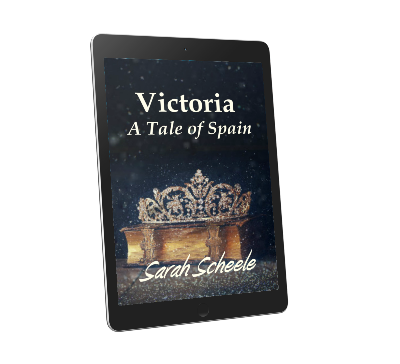 The trip itself—the fact I went to live with relatives that I barely knew for three months in a foreign country—WAS the story. I can’t stress enough that I did not know these relatives well at all and then I suddenly spent all my time with them. There was also plenty of complexity in all the family relationships which is why other people who are influential to our interactions on the trip are also shown in Victoria. There was no reason to look for made-up historical drama when such a rich supply of it was already available from our real lives. 😊 The action is primarily in Spain since I was there the longest but the other places we toured appear as a mashup of glamorous public buildings at the end of the book. Except for Ireland, unfortunately because this Thursday is St. Patrick's Day! But perhaps this brief visit wasn't very meaningful to any of us. It's the only place where I bought no souvenirs. To keep identities a bit private, some of the relationships, such as age or gender of siblings, have been fictionalized, and I have not included an appendix clarifying what character is meant to be who in real life. But I will say that all the characters are based on someone from my life. I based Isabelle (Mary in the original set of two separate stories) on myself. And since these characters are so real, it will be easy for readers to recognize them from their own families and friends. I’m sure you have this mix of people in your lives too. An upside-down mirror is not a broken mirror, after all. All you have to do is turn it around and it will show your own face very accurately.
The trip itself—the fact I went to live with relatives that I barely knew for three months in a foreign country—WAS the story. I can’t stress enough that I did not know these relatives well at all and then I suddenly spent all my time with them. There was also plenty of complexity in all the family relationships which is why other people who are influential to our interactions on the trip are also shown in Victoria. There was no reason to look for made-up historical drama when such a rich supply of it was already available from our real lives. 😊 The action is primarily in Spain since I was there the longest but the other places we toured appear as a mashup of glamorous public buildings at the end of the book. Except for Ireland, unfortunately because this Thursday is St. Patrick's Day! But perhaps this brief visit wasn't very meaningful to any of us. It's the only place where I bought no souvenirs. To keep identities a bit private, some of the relationships, such as age or gender of siblings, have been fictionalized, and I have not included an appendix clarifying what character is meant to be who in real life. But I will say that all the characters are based on someone from my life. I based Isabelle (Mary in the original set of two separate stories) on myself. And since these characters are so real, it will be easy for readers to recognize them from their own families and friends. I’m sure you have this mix of people in your lives too. An upside-down mirror is not a broken mirror, after all. All you have to do is turn it around and it will show your own face very accurately.
Have you ever toured a place and wondered what would have happened if you’d actually lived there?
I once visited the country of Spain with my aunt and cousins. While there, I wondered what our lives would have looked like had we lived in historical instead of modern Spain. This story is filled with poetic license and places real people and real places into the Spanish historical setting of the places I toured.
Victoria is a teenage duchess who lives in the Alcazar in Segovia with her parents and many sisters. But their peaceful lives are shattered when it turns out the young King, the son of the haughty and cruel Phillip II, is out to get them. Victoria’s father, the duke, owns something that could threaten the succession.
When she is warned by a hired assassin who has a strange fondness for her sister, Victoria travels incognito with a group of tourists. A visit to the royal court, a midnight escape, and the help of a handsome prince will bring her family back together and restore it to royal favor.
Both based in fact and entirely fictional, this book is a tribute to an unforgettable summer: to a country that I was privileged to visit: and to the many people who appear in the story's pages in historical disguise.
And there will be more updates.
But I found that if I took a smallish rectangular mirror with rather sharp edges—no frame—that was lying in my mother’s things, I could hold it to my nose with the mirror facing up and everything up above looked as if I was walking right into it. Upside down, the ceiling of the porch, the now massive sky ringing it, and the puffy white clouds appeared, in an optical illusion, to be something I was about to walk into, to tip off into, in fact. I used to walk all over the porch because it seemed like the porch roof was a balcony and then it suddenly disappeared as I catapulted into sky that I could magically walk on! Then I walked off of it into a fantasy world of things reflected upside down in the mirror. This picture shows what I got out of it emotionally, how beautiful I thought it was--except for the ocean waves. I don't remember any of those in our sky!
 Victoria: A Tale of Spain was a book that I got 100% upside down at first. It was inspired by a trip to Europe. After all, how could I not use this wonderful opportunity that I had to see historic places? Many people haven’t had that chance to improve their writing. I HAD TO write a book about it, so I started by writing two separate stories. Gradually I sewed the two related parts into one, but no matter what I did with it, Victoria: A Tale of Spain was a left shoe on a right foot. I was getting something wrong. Last year, I again wondered (for the millionth time) how to describe Victoria. It really seemed to offer nothing at all to my publications. Every element I could use to describe it applied to at least one of my other books—historical, drawn from places I’d known, juvenile audience, adventure, female protagonist. What did this book offer that was unique? But I did not have a memoir or a book that really drew on my family experiences instead of just scenery and images of where I lived. Once I thought—“perhaps this is a disguised memoir, a sort of creative nonfiction. It’s really just us dressed up in historical costumes and its characters are modern, rather than this really being a book about historical times”—the story became crystal-clear. And these elements, come to think of it, had been in the book all along. I would have seen that if I hadn't been looking at it from an alternative angle, like I used to look at the sky in that mirror as a child.
Victoria: A Tale of Spain was a book that I got 100% upside down at first. It was inspired by a trip to Europe. After all, how could I not use this wonderful opportunity that I had to see historic places? Many people haven’t had that chance to improve their writing. I HAD TO write a book about it, so I started by writing two separate stories. Gradually I sewed the two related parts into one, but no matter what I did with it, Victoria: A Tale of Spain was a left shoe on a right foot. I was getting something wrong. Last year, I again wondered (for the millionth time) how to describe Victoria. It really seemed to offer nothing at all to my publications. Every element I could use to describe it applied to at least one of my other books—historical, drawn from places I’d known, juvenile audience, adventure, female protagonist. What did this book offer that was unique? But I did not have a memoir or a book that really drew on my family experiences instead of just scenery and images of where I lived. Once I thought—“perhaps this is a disguised memoir, a sort of creative nonfiction. It’s really just us dressed up in historical costumes and its characters are modern, rather than this really being a book about historical times”—the story became crystal-clear. And these elements, come to think of it, had been in the book all along. I would have seen that if I hadn't been looking at it from an alternative angle, like I used to look at the sky in that mirror as a child.  The trip itself—the fact I went to live with relatives that I barely knew for three months in a foreign country—WAS the story. I can’t stress enough that I did not know these relatives well at all and then I suddenly spent all my time with them. There was also plenty of complexity in all the family relationships which is why other people who are influential to our interactions on the trip are also shown in Victoria. There was no reason to look for made-up historical drama when such a rich supply of it was already available from our real lives. 😊 The action is primarily in Spain since I was there the longest but the other places we toured appear as a mashup of glamorous public buildings at the end of the book. Except for Ireland, unfortunately because this Thursday is St. Patrick's Day! But perhaps this brief visit wasn't very meaningful to any of us. It's the only place where I bought no souvenirs. To keep identities a bit private, some of the relationships, such as age or gender of siblings, have been fictionalized, and I have not included an appendix clarifying what character is meant to be who in real life. But I will say that all the characters are based on someone from my life. I based Isabelle (Mary in the original set of two separate stories) on myself. And since these characters are so real, it will be easy for readers to recognize them from their own families and friends. I’m sure you have this mix of people in your lives too. An upside-down mirror is not a broken mirror, after all. All you have to do is turn it around and it will show your own face very accurately.
The trip itself—the fact I went to live with relatives that I barely knew for three months in a foreign country—WAS the story. I can’t stress enough that I did not know these relatives well at all and then I suddenly spent all my time with them. There was also plenty of complexity in all the family relationships which is why other people who are influential to our interactions on the trip are also shown in Victoria. There was no reason to look for made-up historical drama when such a rich supply of it was already available from our real lives. 😊 The action is primarily in Spain since I was there the longest but the other places we toured appear as a mashup of glamorous public buildings at the end of the book. Except for Ireland, unfortunately because this Thursday is St. Patrick's Day! But perhaps this brief visit wasn't very meaningful to any of us. It's the only place where I bought no souvenirs. To keep identities a bit private, some of the relationships, such as age or gender of siblings, have been fictionalized, and I have not included an appendix clarifying what character is meant to be who in real life. But I will say that all the characters are based on someone from my life. I based Isabelle (Mary in the original set of two separate stories) on myself. And since these characters are so real, it will be easy for readers to recognize them from their own families and friends. I’m sure you have this mix of people in your lives too. An upside-down mirror is not a broken mirror, after all. All you have to do is turn it around and it will show your own face very accurately.Have you ever toured a place and wondered what would have happened if you’d actually lived there?
I once visited the country of Spain with my aunt and cousins. While there, I wondered what our lives would have looked like had we lived in historical instead of modern Spain. This story is filled with poetic license and places real people and real places into the Spanish historical setting of the places I toured.
Victoria is a teenage duchess who lives in the Alcazar in Segovia with her parents and many sisters. But their peaceful lives are shattered when it turns out the young King, the son of the haughty and cruel Phillip II, is out to get them. Victoria’s father, the duke, owns something that could threaten the succession.
When she is warned by a hired assassin who has a strange fondness for her sister, Victoria travels incognito with a group of tourists. A visit to the royal court, a midnight escape, and the help of a handsome prince will bring her family back together and restore it to royal favor.
Both based in fact and entirely fictional, this book is a tribute to an unforgettable summer: to a country that I was privileged to visit: and to the many people who appear in the story's pages in historical disguise.
And there will be more updates.
Published on March 17, 2022 08:30
March 3, 2022
An Open and Shut Case of Bad Hair
Sooner or later, every writer must face the western.
Now how is that for an opening line? Got your attention didn’t I? And it’s a sure bet you feel like arguing with me right off the bat. Westerns aren’t that important to every writer. They’re a niche subgenre and honestly old-fashioned into the bargain. A cultural reference, not a pinpoint of one’s career. But I have found it to be otherwise. Let me clarify what I mean by the overwhelming importance of this genre for writers.
One of the ways you can tell a good western from a bad one is the hair. Always for the women, less so for the men, but sometimes for them as well. After a long while, it clicked in my mind that I invariably felt westerns were lesser if the characters had bad hair. This is also a really tricky grading system because a frumpy, grubby, rangy, even unkempt look is native to the genre. So how can you say anyone in it has good hair, exactly? All you have to do is watch some of those 80s westerns like The Shadow Riders and you’ll see men who look like teddy bears, they are so scruffy and bearded. The women have natural hair for the most part--with a few terrible hairstyles sprinkled in there. Most westerns have female leads with tall cake-like wigs of hair in unnatural colors. Or they have dirty, stringy hair without texture, in little pigtails, or in rickety, noodle-like curls. Always, always, a bad western. Yet, untidy or at least not fashionable hair would be what women in the West really had, right? This was a survival setting, after all. It was a harsh place to live. Having perfect hair was not on everyone’s minds.
The fact is that people view the western in a simplistic way. They believe it is all cowboys and action-adventure, a superficial genre. The reactions that authors and their audiences have towards westerns (including expressing negative opinions; showing theoretical positivity but never actually getting involved; writing, reading, or watching westerns; or declining to comment on the whole conversation) say a lot more about them than they might believe when they make these decisions. It’s strange that with so many of the storylines featuring criminals and outlaws, nobody ever suspects westerns of harboring deceptive elements that don’t appear on the surface. Of being an insider thing—you either know exactly how the characters should look or you don’t. Just because the characters have guns, horses, and frumpy hair and clothing does not mean it’s the right frumpy hair. There’s correct bad hair and then there’s just . .. BAD hair. When watching a western or reading one, you should never assume that you know what is going on right away. People are also likely to approach the subject with overconfidence.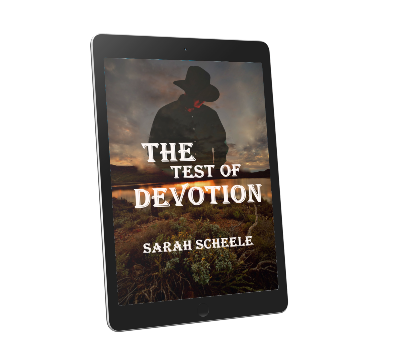 The Test of Devotion--which is, by the way, a western--revealed a lot about the disconnect I had with readers. For instance, I wrote this book under a belief it was a market-oriented story and was what readers wanted to see. I needed to make more money at my writing, so I tried a conventional western romance genre. What I understood later, to my great amusement, was that people felt the opposite—that this book was a silly oddity written for no apparent reason. Because I didn't handle the material very well, it was easy to think that I had tried to tell a story that was over my head. Trying to write something for market is pretentious only if the idea of having readers is laughable, which it isn't. I have always had readers. 😊 The book was not inherently out of my league if I had really wanted to write it. The real problem was that I didn't enjoy writing it, which ironically led to it being less successful than if I had written whatever I wanted to. I was then stuck with a story that had now really become a drifting oddity (although it had not been intended that way), so I rewrote it into a book I WOULD much rather see in print. There is no point in writing something that bores you if it doesn’t please anybody else either. Besides, trying to please people can backfire. I’ve often found that when I’m more of a jerk, things go better. (Yes, I can actually be one, in a We-Still-Like-Her-Anyway-Mostly kind of way. Just ask my family.) 😊
The Test of Devotion--which is, by the way, a western--revealed a lot about the disconnect I had with readers. For instance, I wrote this book under a belief it was a market-oriented story and was what readers wanted to see. I needed to make more money at my writing, so I tried a conventional western romance genre. What I understood later, to my great amusement, was that people felt the opposite—that this book was a silly oddity written for no apparent reason. Because I didn't handle the material very well, it was easy to think that I had tried to tell a story that was over my head. Trying to write something for market is pretentious only if the idea of having readers is laughable, which it isn't. I have always had readers. 😊 The book was not inherently out of my league if I had really wanted to write it. The real problem was that I didn't enjoy writing it, which ironically led to it being less successful than if I had written whatever I wanted to. I was then stuck with a story that had now really become a drifting oddity (although it had not been intended that way), so I rewrote it into a book I WOULD much rather see in print. There is no point in writing something that bores you if it doesn’t please anybody else either. Besides, trying to please people can backfire. I’ve often found that when I’m more of a jerk, things go better. (Yes, I can actually be one, in a We-Still-Like-Her-Anyway-Mostly kind of way. Just ask my family.) 😊
Gunslingers should take notice. There are job openings available.
Persevering Henry Trevalyn is looking for his fiancé, who ran off with somebody else after he was thrown in jail.
Cold-hearted outlaw Hawk seeks a profit from a greedy local politico with an eye to the Governor’s mansion—and the Governor’s daughter.
Grumpy Tony Forsythe wants boarders for his small, run-down Laredo hotel and he’s willing to accept pretty much anyone—even a very suspicious, very glamorous young woman from the East who has no business being out here in no man’s land.
And Viajero isn’t searching for anything. A bored teenager who lives on the wrong side of the law, he embraces his outlaw background until Henry Trevalyn makes him join the Quest for Arabella.
Riding over miles of arid land to look for someone he’s never seen takes Viajero to a certain hotel—and after that, he and the hotel keeper’s pretty daughter must race to foil a murder in this fast-paced western set in Texas.
And there will be more updates.
Now how is that for an opening line? Got your attention didn’t I? And it’s a sure bet you feel like arguing with me right off the bat. Westerns aren’t that important to every writer. They’re a niche subgenre and honestly old-fashioned into the bargain. A cultural reference, not a pinpoint of one’s career. But I have found it to be otherwise. Let me clarify what I mean by the overwhelming importance of this genre for writers.
One of the ways you can tell a good western from a bad one is the hair. Always for the women, less so for the men, but sometimes for them as well. After a long while, it clicked in my mind that I invariably felt westerns were lesser if the characters had bad hair. This is also a really tricky grading system because a frumpy, grubby, rangy, even unkempt look is native to the genre. So how can you say anyone in it has good hair, exactly? All you have to do is watch some of those 80s westerns like The Shadow Riders and you’ll see men who look like teddy bears, they are so scruffy and bearded. The women have natural hair for the most part--with a few terrible hairstyles sprinkled in there. Most westerns have female leads with tall cake-like wigs of hair in unnatural colors. Or they have dirty, stringy hair without texture, in little pigtails, or in rickety, noodle-like curls. Always, always, a bad western. Yet, untidy or at least not fashionable hair would be what women in the West really had, right? This was a survival setting, after all. It was a harsh place to live. Having perfect hair was not on everyone’s minds.
The fact is that people view the western in a simplistic way. They believe it is all cowboys and action-adventure, a superficial genre. The reactions that authors and their audiences have towards westerns (including expressing negative opinions; showing theoretical positivity but never actually getting involved; writing, reading, or watching westerns; or declining to comment on the whole conversation) say a lot more about them than they might believe when they make these decisions. It’s strange that with so many of the storylines featuring criminals and outlaws, nobody ever suspects westerns of harboring deceptive elements that don’t appear on the surface. Of being an insider thing—you either know exactly how the characters should look or you don’t. Just because the characters have guns, horses, and frumpy hair and clothing does not mean it’s the right frumpy hair. There’s correct bad hair and then there’s just . .. BAD hair. When watching a western or reading one, you should never assume that you know what is going on right away. People are also likely to approach the subject with overconfidence.
 The Test of Devotion--which is, by the way, a western--revealed a lot about the disconnect I had with readers. For instance, I wrote this book under a belief it was a market-oriented story and was what readers wanted to see. I needed to make more money at my writing, so I tried a conventional western romance genre. What I understood later, to my great amusement, was that people felt the opposite—that this book was a silly oddity written for no apparent reason. Because I didn't handle the material very well, it was easy to think that I had tried to tell a story that was over my head. Trying to write something for market is pretentious only if the idea of having readers is laughable, which it isn't. I have always had readers. 😊 The book was not inherently out of my league if I had really wanted to write it. The real problem was that I didn't enjoy writing it, which ironically led to it being less successful than if I had written whatever I wanted to. I was then stuck with a story that had now really become a drifting oddity (although it had not been intended that way), so I rewrote it into a book I WOULD much rather see in print. There is no point in writing something that bores you if it doesn’t please anybody else either. Besides, trying to please people can backfire. I’ve often found that when I’m more of a jerk, things go better. (Yes, I can actually be one, in a We-Still-Like-Her-Anyway-Mostly kind of way. Just ask my family.) 😊
The Test of Devotion--which is, by the way, a western--revealed a lot about the disconnect I had with readers. For instance, I wrote this book under a belief it was a market-oriented story and was what readers wanted to see. I needed to make more money at my writing, so I tried a conventional western romance genre. What I understood later, to my great amusement, was that people felt the opposite—that this book was a silly oddity written for no apparent reason. Because I didn't handle the material very well, it was easy to think that I had tried to tell a story that was over my head. Trying to write something for market is pretentious only if the idea of having readers is laughable, which it isn't. I have always had readers. 😊 The book was not inherently out of my league if I had really wanted to write it. The real problem was that I didn't enjoy writing it, which ironically led to it being less successful than if I had written whatever I wanted to. I was then stuck with a story that had now really become a drifting oddity (although it had not been intended that way), so I rewrote it into a book I WOULD much rather see in print. There is no point in writing something that bores you if it doesn’t please anybody else either. Besides, trying to please people can backfire. I’ve often found that when I’m more of a jerk, things go better. (Yes, I can actually be one, in a We-Still-Like-Her-Anyway-Mostly kind of way. Just ask my family.) 😊Gunslingers should take notice. There are job openings available.
Persevering Henry Trevalyn is looking for his fiancé, who ran off with somebody else after he was thrown in jail.
Cold-hearted outlaw Hawk seeks a profit from a greedy local politico with an eye to the Governor’s mansion—and the Governor’s daughter.
Grumpy Tony Forsythe wants boarders for his small, run-down Laredo hotel and he’s willing to accept pretty much anyone—even a very suspicious, very glamorous young woman from the East who has no business being out here in no man’s land.
And Viajero isn’t searching for anything. A bored teenager who lives on the wrong side of the law, he embraces his outlaw background until Henry Trevalyn makes him join the Quest for Arabella.
Riding over miles of arid land to look for someone he’s never seen takes Viajero to a certain hotel—and after that, he and the hotel keeper’s pretty daughter must race to foil a murder in this fast-paced western set in Texas.
And there will be more updates.
Published on March 03, 2022 08:30
February 17, 2022
When Hindsight is 20/400, Ignore the Judgmental
Last year I became a driving teacher. Our family uses the popular Driver Ed in a Box method because graduates of this program have over 80% reduction in collisions. (Disclaimer: IF they follow the program. I made an error in teaching things out of order and you'll see below what happened to me....) After months of listening to audio, watching video, scanning the road for hazards, and practicing parking on hot summer afternoons, I started to see spots before my eyes. Spots of anxiety, of trying to prepare for any possible error, of worry that someone is going to back into my car. I’m endlessly afraid of a collision because as the teacher, I am responsible. But situations come up through the actions of other drivers, actions I can’t control, and I still have to be the responsible adult.
Actually, this has been a fantastic experience. I’ve loved spending more time with my sister working as a team on something and it was amazing to see how much knowledge I had that I could pass on to her. Now you might wonder, if this was so great, WHY I was paranoid all the time. That’s easy. 😊 It’s because our second day together in the car, I introduced some material too early and soon we smashed through a pillar on the porch and bent the side of the lawnmower like a plastic plate. It’s a good thing the lawnmower was there otherwise she would have driven through the house! That was a terrifying afternoon. We got very lucky, of course. The pillar was easily replaced and the lawnmower could be bent back into shape. The car was not damaged. This picture is of our driveway, the lawnmower (see on the right), and our neighbor’s dogs who happen to be there. But I show you this picture because we didn’t take one right after the collision. We were too busy and I was thinking “got to take responsibility for this” the whole time. But it made me a much better teacher in the end and I think a smarter person too.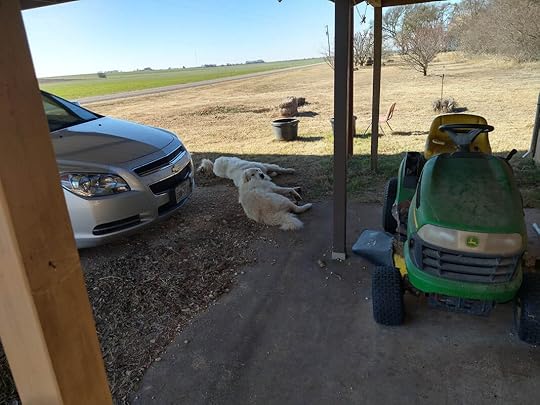 Any of you ever tried to do something you haven’t done before? New, for the first time? Learning or teaching can both be scary and nobody out there can say they nailed them right away. They might act like they were flawless. But actually they simply don’t remember the past very clearly and are lumping their since acquired skills with the memories of first learning as if the two had existed side by side. There is a rule (always applied with a bit of a sarcastic smile) that hindsight is 20/20. But with every rule you’ll find an exception and it's those who pretend they had no trouble along the journey. Their hindsight is frankly myopic and inaccurate. We all make mistakes starting out--especially if we are busy and juggling several things at once. And everyone I know is always proud to say they've been busy and have had too much going on.
Any of you ever tried to do something you haven’t done before? New, for the first time? Learning or teaching can both be scary and nobody out there can say they nailed them right away. They might act like they were flawless. But actually they simply don’t remember the past very clearly and are lumping their since acquired skills with the memories of first learning as if the two had existed side by side. There is a rule (always applied with a bit of a sarcastic smile) that hindsight is 20/20. But with every rule you’ll find an exception and it's those who pretend they had no trouble along the journey. Their hindsight is frankly myopic and inaccurate. We all make mistakes starting out--especially if we are busy and juggling several things at once. And everyone I know is always proud to say they've been busy and have had too much going on. 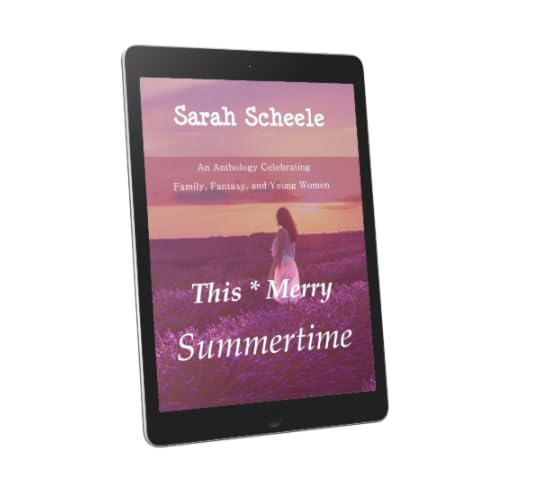 This Merry Summertime was a charming example of a flop when I released it a couple of years ago. That was my fault since I was very busy when I published it--apparently too busy to notice what really links the book is not humor, but young women because it says so in the subtitle. It's "An Anthology Celebrating Family, Fantasy, and Young Women," not "A Collection of Satirical Short Stories." Like when I taught my sister driving techniques out of order though they were clearly delineated in front of me, I was just being stupid and I wrote a description for the book as a set of satires when that's not even what's in it. (The result of stress, is my theory. 2020 was a hard year.) True there is a lot of comedy in the book, but it only serves to lighten the mood around some pretty serious ideas. Each story feature women and girls who dictate the plots even when the men and boys think they have all the power. Naturally, since 85% of the anthology deals with bygone eras of history. And with last Monday being Valentine's Day, it's neatly appropriate to talk selling points on a book that praises the power of women in their relationships, since every short in it has a romantic plot too. 😊
This Merry Summertime was a charming example of a flop when I released it a couple of years ago. That was my fault since I was very busy when I published it--apparently too busy to notice what really links the book is not humor, but young women because it says so in the subtitle. It's "An Anthology Celebrating Family, Fantasy, and Young Women," not "A Collection of Satirical Short Stories." Like when I taught my sister driving techniques out of order though they were clearly delineated in front of me, I was just being stupid and I wrote a description for the book as a set of satires when that's not even what's in it. (The result of stress, is my theory. 2020 was a hard year.) True there is a lot of comedy in the book, but it only serves to lighten the mood around some pretty serious ideas. Each story feature women and girls who dictate the plots even when the men and boys think they have all the power. Naturally, since 85% of the anthology deals with bygone eras of history. And with last Monday being Valentine's Day, it's neatly appropriate to talk selling points on a book that praises the power of women in their relationships, since every short in it has a romantic plot too. 😊
A book for princesses of every age . . .
Young or old, are you a Princess? Rich or poor, it doesn’t matter at all. Powerful or commonplace, it isn’t important. Girls are princesses and women are princesses at heart. This set of seven comedy stories about royals and royalty celebrates the princess in everyone. Here are the names of the protagonists—the very royal young ladies.
Meet Arangiphaten: A haughty Egyptian queen whose romance with a vampire puts a lot of teenagers into sometimes slapstick danger—and eventually love triumphs over all.
Meet Helena and Nora: Two ordinary young women who get tangled up in Shakespeare’s magical world of romance—one as an actress playing Ophelia and one as a character in a comedy revision of All’s Well That Ends Well.
Meet Ella: A Cinderella in a land filled with fairies who think they’re better than people—until one of them takes a lot of interest in her.
Meet AnnaRuth and Everwynne: Teenage girls filled with all the angst and self-importance of growing up, as well as all its beauty.
Meet The Heroine: True to her name, a lovely young woman who comes like a princess to a befuddled western town and eventually restores it to sanity.
Light-hearted with just enough snark to be true to human nature, wit adds depth to these classic tales of love and friendship. In their families, their friendships, and their romances, girls bring a special touch to the world.
And there will be more updates.
Actually, this has been a fantastic experience. I’ve loved spending more time with my sister working as a team on something and it was amazing to see how much knowledge I had that I could pass on to her. Now you might wonder, if this was so great, WHY I was paranoid all the time. That’s easy. 😊 It’s because our second day together in the car, I introduced some material too early and soon we smashed through a pillar on the porch and bent the side of the lawnmower like a plastic plate. It’s a good thing the lawnmower was there otherwise she would have driven through the house! That was a terrifying afternoon. We got very lucky, of course. The pillar was easily replaced and the lawnmower could be bent back into shape. The car was not damaged. This picture is of our driveway, the lawnmower (see on the right), and our neighbor’s dogs who happen to be there. But I show you this picture because we didn’t take one right after the collision. We were too busy and I was thinking “got to take responsibility for this” the whole time. But it made me a much better teacher in the end and I think a smarter person too.
 Any of you ever tried to do something you haven’t done before? New, for the first time? Learning or teaching can both be scary and nobody out there can say they nailed them right away. They might act like they were flawless. But actually they simply don’t remember the past very clearly and are lumping their since acquired skills with the memories of first learning as if the two had existed side by side. There is a rule (always applied with a bit of a sarcastic smile) that hindsight is 20/20. But with every rule you’ll find an exception and it's those who pretend they had no trouble along the journey. Their hindsight is frankly myopic and inaccurate. We all make mistakes starting out--especially if we are busy and juggling several things at once. And everyone I know is always proud to say they've been busy and have had too much going on.
Any of you ever tried to do something you haven’t done before? New, for the first time? Learning or teaching can both be scary and nobody out there can say they nailed them right away. They might act like they were flawless. But actually they simply don’t remember the past very clearly and are lumping their since acquired skills with the memories of first learning as if the two had existed side by side. There is a rule (always applied with a bit of a sarcastic smile) that hindsight is 20/20. But with every rule you’ll find an exception and it's those who pretend they had no trouble along the journey. Their hindsight is frankly myopic and inaccurate. We all make mistakes starting out--especially if we are busy and juggling several things at once. And everyone I know is always proud to say they've been busy and have had too much going on.  This Merry Summertime was a charming example of a flop when I released it a couple of years ago. That was my fault since I was very busy when I published it--apparently too busy to notice what really links the book is not humor, but young women because it says so in the subtitle. It's "An Anthology Celebrating Family, Fantasy, and Young Women," not "A Collection of Satirical Short Stories." Like when I taught my sister driving techniques out of order though they were clearly delineated in front of me, I was just being stupid and I wrote a description for the book as a set of satires when that's not even what's in it. (The result of stress, is my theory. 2020 was a hard year.) True there is a lot of comedy in the book, but it only serves to lighten the mood around some pretty serious ideas. Each story feature women and girls who dictate the plots even when the men and boys think they have all the power. Naturally, since 85% of the anthology deals with bygone eras of history. And with last Monday being Valentine's Day, it's neatly appropriate to talk selling points on a book that praises the power of women in their relationships, since every short in it has a romantic plot too. 😊
This Merry Summertime was a charming example of a flop when I released it a couple of years ago. That was my fault since I was very busy when I published it--apparently too busy to notice what really links the book is not humor, but young women because it says so in the subtitle. It's "An Anthology Celebrating Family, Fantasy, and Young Women," not "A Collection of Satirical Short Stories." Like when I taught my sister driving techniques out of order though they were clearly delineated in front of me, I was just being stupid and I wrote a description for the book as a set of satires when that's not even what's in it. (The result of stress, is my theory. 2020 was a hard year.) True there is a lot of comedy in the book, but it only serves to lighten the mood around some pretty serious ideas. Each story feature women and girls who dictate the plots even when the men and boys think they have all the power. Naturally, since 85% of the anthology deals with bygone eras of history. And with last Monday being Valentine's Day, it's neatly appropriate to talk selling points on a book that praises the power of women in their relationships, since every short in it has a romantic plot too. 😊A book for princesses of every age . . .
Young or old, are you a Princess? Rich or poor, it doesn’t matter at all. Powerful or commonplace, it isn’t important. Girls are princesses and women are princesses at heart. This set of seven comedy stories about royals and royalty celebrates the princess in everyone. Here are the names of the protagonists—the very royal young ladies.
Meet Arangiphaten: A haughty Egyptian queen whose romance with a vampire puts a lot of teenagers into sometimes slapstick danger—and eventually love triumphs over all.
Meet Helena and Nora: Two ordinary young women who get tangled up in Shakespeare’s magical world of romance—one as an actress playing Ophelia and one as a character in a comedy revision of All’s Well That Ends Well.
Meet Ella: A Cinderella in a land filled with fairies who think they’re better than people—until one of them takes a lot of interest in her.
Meet AnnaRuth and Everwynne: Teenage girls filled with all the angst and self-importance of growing up, as well as all its beauty.
Meet The Heroine: True to her name, a lovely young woman who comes like a princess to a befuddled western town and eventually restores it to sanity.
Light-hearted with just enough snark to be true to human nature, wit adds depth to these classic tales of love and friendship. In their families, their friendships, and their romances, girls bring a special touch to the world.
And there will be more updates.
Published on February 17, 2022 10:30
February 3, 2022
The Game's The Thing (Sort of, Eventually)
I will confess something that might or might not matter to all of you—but I will come clean about it anyway. I don’t enjoy putting puzzles together. 😊
When I was a kid I received my fair share of puzzles and so did all my siblings. Puzzles are a nice, safe choice for someone you don’t know well. Some of the pictures were very pretty—lovely paintings or nice stock photos of things like barns against green woods. Eventually as an adult I realized I had NEVER even opened some of them and just gave them away. But many adults love puzzles. They are experts and spend weeks putting together extremely difficult puzzles with thousands of pieces. Often the pictures are chosen because it’s hard to put them together. I remember reading about a couple who loved to do hard puzzles and they said the hardest one they had ever tried was of three cheetahs. Anyone can use their imagination and visualize what a 5000-piece puzzle of nothing but random spots and golden specks would be like. I would consider that real torture, but I think these people enjoyed the challenge.
In recent years I have worked on puzzles a little more because I needed to improve my analytical skills for SWGOH. I love to collect the little characters in this video game, but there is also a population of serious “gaming is my life” people there and if you do not get some of the more difficult, higher-tier characters you can’t get into a good guild and many rewards are available only in guilds. These difficult, higher-tier characters appear in special events that require, in some cases, massive preparation. Seriously, there are whole Youtube channels devoted to tutorial videos for how to do these events and how to play this game generally, and I’m like “I just want this event to be over with quickly, please make it less extreme!”
But then, as I said before, I never liked puzzles. Doing these really hard events is like doing a puzzle. Every piece has to fit together perfectly, including that last piece that’s fallen under the table or gotten lost, or the whole thing won’t work. 😊 Gradually, I’ve learned to enjoy challenging myself more. I realized after watching these tutorial videos that some people actually think this is FUN. These events are deliberately difficult because people love sitting down with a challenge and spending hours figuring out how to do it. They feel it teases and sharpens their brains to examine every angle until they find the right strategy. Until all the pieces are in place. I’m even starting to appreciate the sense of accomplishment prepping for one of these game events is giving me and the heightened sense of detail I have gained.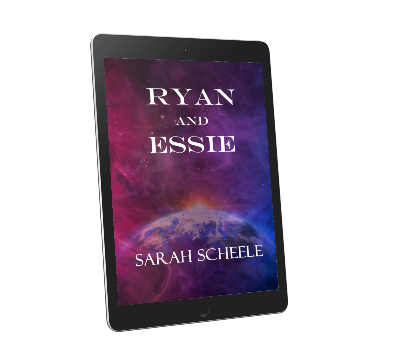 One of the older books I looked at very little at first was Ryan and Essie. This was a manuscript from my teen years that I put out there simply because I was publishing a lot, like 3 books a year, and was running out of material. I felt it wasn't the best story idea and it didn't have a great hook, but I tried it anyway and then forgot about it. Later I realized that many of its situations could have coded significance--and a reader who "gets" this story might enjoy fitting all the symbolic pieces together to form the completed concept in their mind. Some people love to keep their brains always working, to challenge themselves even when reading a book recreationally. So then I made some edits. I bumped Essie's age up to equal Ryan's and gave her father a specific occupation. This matters because Ryan was given strong individual development, but we knew almost nothing about Essie and her plots were not emotionally equivalent to his because she was younger. Small changes—but for the person who sees a special meaning in every detail, important perhaps. If you put together a puzzle, you have to make sure you do it right.
One of the older books I looked at very little at first was Ryan and Essie. This was a manuscript from my teen years that I put out there simply because I was publishing a lot, like 3 books a year, and was running out of material. I felt it wasn't the best story idea and it didn't have a great hook, but I tried it anyway and then forgot about it. Later I realized that many of its situations could have coded significance--and a reader who "gets" this story might enjoy fitting all the symbolic pieces together to form the completed concept in their mind. Some people love to keep their brains always working, to challenge themselves even when reading a book recreationally. So then I made some edits. I bumped Essie's age up to equal Ryan's and gave her father a specific occupation. This matters because Ryan was given strong individual development, but we knew almost nothing about Essie and her plots were not emotionally equivalent to his because she was younger. Small changes—but for the person who sees a special meaning in every detail, important perhaps. If you put together a puzzle, you have to make sure you do it right.
I am Tarvelas of the Emerald Castle. On Caricanus, a planet far beyond yours in the distant reaches of the universe, my home is called Castile Enfarm. It is one of the seven great castles of Caricanus. Each one was carved out of a great jewel in ancient times and filled with the light of Trisagion. Our deity.
My home is dying. Humans made this planet's history when they came to it from your world. Now, two humans have come to Caricanus again. A boy and a girl. They are named Ryan and Essie. They are ordinary children except they both possess far too much stubbornness. Their coming is the fulfillment of a prophecy and I know it will kill me. I can feel it. I won't be the only one who dies. What is happening will shake up and change the whole world. And I also know, strange as it sounds, that this is a very good thing. If your world is falling into darkness, there are worse things than death. There are forces of total destruction. These two children represent life and in doing that they bring death to what is old, but not destruction. Right now they focus too much on what is unimportant, on things that don't need to be looked at.
They must learn to care about others.
And there will be more updates.
When I was a kid I received my fair share of puzzles and so did all my siblings. Puzzles are a nice, safe choice for someone you don’t know well. Some of the pictures were very pretty—lovely paintings or nice stock photos of things like barns against green woods. Eventually as an adult I realized I had NEVER even opened some of them and just gave them away. But many adults love puzzles. They are experts and spend weeks putting together extremely difficult puzzles with thousands of pieces. Often the pictures are chosen because it’s hard to put them together. I remember reading about a couple who loved to do hard puzzles and they said the hardest one they had ever tried was of three cheetahs. Anyone can use their imagination and visualize what a 5000-piece puzzle of nothing but random spots and golden specks would be like. I would consider that real torture, but I think these people enjoyed the challenge.
In recent years I have worked on puzzles a little more because I needed to improve my analytical skills for SWGOH. I love to collect the little characters in this video game, but there is also a population of serious “gaming is my life” people there and if you do not get some of the more difficult, higher-tier characters you can’t get into a good guild and many rewards are available only in guilds. These difficult, higher-tier characters appear in special events that require, in some cases, massive preparation. Seriously, there are whole Youtube channels devoted to tutorial videos for how to do these events and how to play this game generally, and I’m like “I just want this event to be over with quickly, please make it less extreme!”
But then, as I said before, I never liked puzzles. Doing these really hard events is like doing a puzzle. Every piece has to fit together perfectly, including that last piece that’s fallen under the table or gotten lost, or the whole thing won’t work. 😊 Gradually, I’ve learned to enjoy challenging myself more. I realized after watching these tutorial videos that some people actually think this is FUN. These events are deliberately difficult because people love sitting down with a challenge and spending hours figuring out how to do it. They feel it teases and sharpens their brains to examine every angle until they find the right strategy. Until all the pieces are in place. I’m even starting to appreciate the sense of accomplishment prepping for one of these game events is giving me and the heightened sense of detail I have gained.
 One of the older books I looked at very little at first was Ryan and Essie. This was a manuscript from my teen years that I put out there simply because I was publishing a lot, like 3 books a year, and was running out of material. I felt it wasn't the best story idea and it didn't have a great hook, but I tried it anyway and then forgot about it. Later I realized that many of its situations could have coded significance--and a reader who "gets" this story might enjoy fitting all the symbolic pieces together to form the completed concept in their mind. Some people love to keep their brains always working, to challenge themselves even when reading a book recreationally. So then I made some edits. I bumped Essie's age up to equal Ryan's and gave her father a specific occupation. This matters because Ryan was given strong individual development, but we knew almost nothing about Essie and her plots were not emotionally equivalent to his because she was younger. Small changes—but for the person who sees a special meaning in every detail, important perhaps. If you put together a puzzle, you have to make sure you do it right.
One of the older books I looked at very little at first was Ryan and Essie. This was a manuscript from my teen years that I put out there simply because I was publishing a lot, like 3 books a year, and was running out of material. I felt it wasn't the best story idea and it didn't have a great hook, but I tried it anyway and then forgot about it. Later I realized that many of its situations could have coded significance--and a reader who "gets" this story might enjoy fitting all the symbolic pieces together to form the completed concept in their mind. Some people love to keep their brains always working, to challenge themselves even when reading a book recreationally. So then I made some edits. I bumped Essie's age up to equal Ryan's and gave her father a specific occupation. This matters because Ryan was given strong individual development, but we knew almost nothing about Essie and her plots were not emotionally equivalent to his because she was younger. Small changes—but for the person who sees a special meaning in every detail, important perhaps. If you put together a puzzle, you have to make sure you do it right.I am Tarvelas of the Emerald Castle. On Caricanus, a planet far beyond yours in the distant reaches of the universe, my home is called Castile Enfarm. It is one of the seven great castles of Caricanus. Each one was carved out of a great jewel in ancient times and filled with the light of Trisagion. Our deity.
My home is dying. Humans made this planet's history when they came to it from your world. Now, two humans have come to Caricanus again. A boy and a girl. They are named Ryan and Essie. They are ordinary children except they both possess far too much stubbornness. Their coming is the fulfillment of a prophecy and I know it will kill me. I can feel it. I won't be the only one who dies. What is happening will shake up and change the whole world. And I also know, strange as it sounds, that this is a very good thing. If your world is falling into darkness, there are worse things than death. There are forces of total destruction. These two children represent life and in doing that they bring death to what is old, but not destruction. Right now they focus too much on what is unimportant, on things that don't need to be looked at.
They must learn to care about others.
And there will be more updates.
Published on February 03, 2022 08:43
January 20, 2022
Comfortable Can Be Uncomfortable, Don't You Agree?
Having a bad cold this week made me really reflect on the nature of comfort-food entertainment, because that’s what you go for like clockwork when you’re sick. As I skimmed through digital movies in my collection, immediately going for the most relaxing ones that would make it seem like my fever and sore throat weren't there, 😊 I noticed Miss Congeniality. I haven’t seen that movie in a while, but I remember a past incident where I had an extremely stressful encounter with a person and I started to have a breakdown. I couldn’t afford to get emotional right then because it was the middle of a party and there were lots of people around me. So I flipped through things to watch in a back room, in the few minutes I had to get a grip on myself, and Miss Congeniality was there. It’s not my favorite movie, but it felt far removed from what I was dealing with and that was the first time I realized it could be considered relaxing. I never forgot that.
Many people find this movie offensive because it’s filled with profanity, has a lot of sexist jokes, and hints about sexual assault in a character's backstory. But when it was released over 20 years ago a lot of women felt it was comfort food. It embodied the chick flick with its mixture of seemingly real life and actual cheerful fantasy. I even heard a group of women at my church planning to put together a little posse to go see the sequel (Miss Congeniality 2.) Comfort is one of the most subjective genres as the characters in comfort fiction are not like real people. They have to appear real enough when you read a book or watch a movie. However, once you return to your life, you'll never see anyone who resembles these characters. That’s because they don’t exist. NOBODY is like that. They are purely fiction and people can strongly disagree about what constitutes a comforting fiction they'd like to see.
John Wayne’s El Dorado, the Night at the Museum Trilogy, Diary of a Wimpy Kid, and the All Creatures Great and Small TV series are all diverse examples of comfort fiction. Writing comfort fiction requires high levels of skill and many writers who use this medium are very talented. They have to find the perfect blend of Feels-Real-But-Actually-Isn’t to make their audience happy and safe. After all, when I was sick what did I need? That's right. Comfort fiction. But non-fans tend to be critical and hostile towards someone else’s comfort fiction. They don’t find it relaxing at all. They know it’s fake or they find many elements in it (like the cursing and sexism in Miss Congeniality) distracting and they tend to say so. So writing comfort work requires not just dedication to achieving a mastery of sheer fiction, but accepting backlash and complaints from people who aren’t the target audience. No one is more hostile than a consumer looking for a different slice of comfort food than the one you’re offering. 😊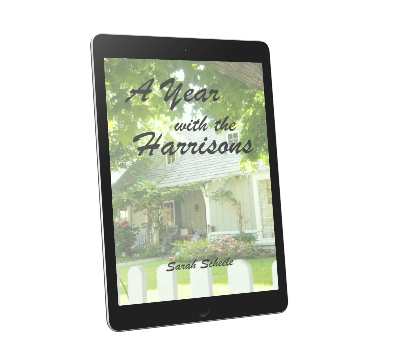 A Year with the Harrisons is in the comfort fiction genre. It looks like the most personal of my stories-- basically about me and my family, just glamorized a bit. But actually it is fiction that intentionally looks personal as an aesthetic. You'd find none of its characters inhabiting the Texas towns and rural areas where I have passed my life. You’d also be unlikely to find its pop star characters anywhere that pop stars and famous musicians hang out. But the illusion that it’s a statement on my life, that it's almost autobiographical but won’t admit it, is part of what makes it a comfort story. 😊 Readers want to believe they've had a window into my background instead of actually exploring it. Comfort fiction is an exact science and every detail has to be perfect to fit the needs of the specific audience, so Harrisons has changed a little over time as my audience has evolved slightly. But the essential story has always been the same. It’s also true that a lot of people aren't going to find this book comforting. They find it distracting or even downright unlikable because they're not the audience. That's the nature of the genre!
A Year with the Harrisons is in the comfort fiction genre. It looks like the most personal of my stories-- basically about me and my family, just glamorized a bit. But actually it is fiction that intentionally looks personal as an aesthetic. You'd find none of its characters inhabiting the Texas towns and rural areas where I have passed my life. You’d also be unlikely to find its pop star characters anywhere that pop stars and famous musicians hang out. But the illusion that it’s a statement on my life, that it's almost autobiographical but won’t admit it, is part of what makes it a comfort story. 😊 Readers want to believe they've had a window into my background instead of actually exploring it. Comfort fiction is an exact science and every detail has to be perfect to fit the needs of the specific audience, so Harrisons has changed a little over time as my audience has evolved slightly. But the essential story has always been the same. It’s also true that a lot of people aren't going to find this book comforting. They find it distracting or even downright unlikable because they're not the audience. That's the nature of the genre!
Welcome to the family!
Faith and family relationships are front and center in Letty Harrison’s life. As the homeschooled daughter of a devoutly religious rural Texas family, the two ideas are almost synonymous in her mind. But the other half of her family isn’t religious at all. Her father’s cousin was a famous pop singer who devoted her life to making money and pushing her daughters into society. Failed relationships and deep rifts have plagued Brenda Harrison’s clan for years. Until a couple of years ago, she never gave a thought to her quiet relatives still living in the heart of Texas. But perhaps wishing to redeem herself—or wanting to extend her authority over others—she offers Letty a scholarship to a college and attempts to reunite with her estranged daughter Betty on a reality show. What she sets in motion is a chain of events that changes everyone’s life for the better. Not least of all—her own.
A Year with the Harrisons is a love story about a family whose members are very fond of their unusual way of life—both branches of it. A love story about two college kids who gradually overcome cultural obstacles to find each other. And a love story about a mother and her daughter, showing that the deepest bonds can create (and overcome) the deepest breaks.
And there will be more updates.
Many people find this movie offensive because it’s filled with profanity, has a lot of sexist jokes, and hints about sexual assault in a character's backstory. But when it was released over 20 years ago a lot of women felt it was comfort food. It embodied the chick flick with its mixture of seemingly real life and actual cheerful fantasy. I even heard a group of women at my church planning to put together a little posse to go see the sequel (Miss Congeniality 2.) Comfort is one of the most subjective genres as the characters in comfort fiction are not like real people. They have to appear real enough when you read a book or watch a movie. However, once you return to your life, you'll never see anyone who resembles these characters. That’s because they don’t exist. NOBODY is like that. They are purely fiction and people can strongly disagree about what constitutes a comforting fiction they'd like to see.
John Wayne’s El Dorado, the Night at the Museum Trilogy, Diary of a Wimpy Kid, and the All Creatures Great and Small TV series are all diverse examples of comfort fiction. Writing comfort fiction requires high levels of skill and many writers who use this medium are very talented. They have to find the perfect blend of Feels-Real-But-Actually-Isn’t to make their audience happy and safe. After all, when I was sick what did I need? That's right. Comfort fiction. But non-fans tend to be critical and hostile towards someone else’s comfort fiction. They don’t find it relaxing at all. They know it’s fake or they find many elements in it (like the cursing and sexism in Miss Congeniality) distracting and they tend to say so. So writing comfort work requires not just dedication to achieving a mastery of sheer fiction, but accepting backlash and complaints from people who aren’t the target audience. No one is more hostile than a consumer looking for a different slice of comfort food than the one you’re offering. 😊
 A Year with the Harrisons is in the comfort fiction genre. It looks like the most personal of my stories-- basically about me and my family, just glamorized a bit. But actually it is fiction that intentionally looks personal as an aesthetic. You'd find none of its characters inhabiting the Texas towns and rural areas where I have passed my life. You’d also be unlikely to find its pop star characters anywhere that pop stars and famous musicians hang out. But the illusion that it’s a statement on my life, that it's almost autobiographical but won’t admit it, is part of what makes it a comfort story. 😊 Readers want to believe they've had a window into my background instead of actually exploring it. Comfort fiction is an exact science and every detail has to be perfect to fit the needs of the specific audience, so Harrisons has changed a little over time as my audience has evolved slightly. But the essential story has always been the same. It’s also true that a lot of people aren't going to find this book comforting. They find it distracting or even downright unlikable because they're not the audience. That's the nature of the genre!
A Year with the Harrisons is in the comfort fiction genre. It looks like the most personal of my stories-- basically about me and my family, just glamorized a bit. But actually it is fiction that intentionally looks personal as an aesthetic. You'd find none of its characters inhabiting the Texas towns and rural areas where I have passed my life. You’d also be unlikely to find its pop star characters anywhere that pop stars and famous musicians hang out. But the illusion that it’s a statement on my life, that it's almost autobiographical but won’t admit it, is part of what makes it a comfort story. 😊 Readers want to believe they've had a window into my background instead of actually exploring it. Comfort fiction is an exact science and every detail has to be perfect to fit the needs of the specific audience, so Harrisons has changed a little over time as my audience has evolved slightly. But the essential story has always been the same. It’s also true that a lot of people aren't going to find this book comforting. They find it distracting or even downright unlikable because they're not the audience. That's the nature of the genre!Welcome to the family!
Faith and family relationships are front and center in Letty Harrison’s life. As the homeschooled daughter of a devoutly religious rural Texas family, the two ideas are almost synonymous in her mind. But the other half of her family isn’t religious at all. Her father’s cousin was a famous pop singer who devoted her life to making money and pushing her daughters into society. Failed relationships and deep rifts have plagued Brenda Harrison’s clan for years. Until a couple of years ago, she never gave a thought to her quiet relatives still living in the heart of Texas. But perhaps wishing to redeem herself—or wanting to extend her authority over others—she offers Letty a scholarship to a college and attempts to reunite with her estranged daughter Betty on a reality show. What she sets in motion is a chain of events that changes everyone’s life for the better. Not least of all—her own.
A Year with the Harrisons is a love story about a family whose members are very fond of their unusual way of life—both branches of it. A love story about two college kids who gradually overcome cultural obstacles to find each other. And a love story about a mother and her daughter, showing that the deepest bonds can create (and overcome) the deepest breaks.
And there will be more updates.
Published on January 20, 2022 08:30
January 6, 2022
It's Always Funny When People Are Wrong
Whether it’s waiting in line on a cold day or realizing that a needed item is all sold out at the last minute; whether it’s having different bits of dialogue inserted or taken out of our favorite book scenes when they are translated to film or discovering that one accidentally ordered a chia instead of orange smoothie at Jamba Juice—everybody has something they find irritating or even comic.
For me, it’s when people believe I’ve said something I have not said. Usually, they then correct me about it or help “explain” to me how things should be done. When in fact, if you listened carefully, you’d find I never actually said the statement being corrected. I said something else. But the person had an “understanding” in their minds that I "must" have said that. Their motive, of course, is that they believe they have a great knowledge of people and of what's going on in the world, basically, so they don't have to listen. They know who all the players are and what everyone is bringing to the table and think they "know" what I'm going to say before I even say it, without paying attention to my actual statements. But then there's a huge risk that they might really know nothing about me after all. 😊 With such poor social skills, how could they? They project attitudes and perceptions of their own onto the words of others and don't hear what the person really said.
I didn’t enjoy historical writing as my first language (I always did sci-fi and fantasy growing up) and this was why--I thought historical authors were tiresome because they did one of three things with routine frequency;
Confuse different eras together, especially if they are chronologically close. This is sloppy and shows a lack of attention to detail. If they have not done enough reading of history, they shouldn't write in it.Emphasize insignificant trends or unfashionable pockets within a past era, people clinging to old ways. While a lot of people did this in reality, it doesn't tell us what is special about that era or what we need to remember about it, as these trends really reflect an earlier era.Show real hostility to the past, seeming to find many values and attitudes of those times threateningly different from ours. They simply impose an anachronistic worldview on the past, projecting their own modern perceptions and ideas on a bygone era.
We don't actually read about the past era that was chosen for any of these books as the author's wishes and preconceptions come to the forefront. And that's absolutely boring to read and I didn't want to write boring books. These works also tended to be flashy, easily found and had lots of downloads, views, or reviews while better researched books were few and hard to find. It appeared to me that historical was largely a low-quality genre. All the fascinating depth of a different culture is lost on people who find out typical baby names for someone born in 1887, but show no respect for the worldview and beliefs of a past society. They simply don't listen and are sure things "must" have been like this, just like they are sure I must have said things I did not say.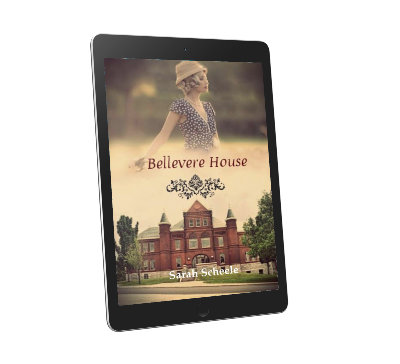 For Bellevere House since I knew I'd be writing in a previous era, the first thing I tried to do was to be respectful of the time period. I didn’t want to write a book about the 1930s, but instead write the book as if it had been written in the 1930s. Mansfield Park as an adaptation of it from the 1930s might have appeared. I wrote the book not to praise Jane Austen or to give moral messages I felt were good. I wrote it to celebrate the vintage era--their language, cliches, foibles, and way of speaking and moving. To my surprise since I had always pursued other interests, I found out I was a lover of history. Mansfield Park came out looking irreconcilably different from the original because the book is not easily reconciled to the update period. But I never actually said that keeping many elements of the original was my goal or even that it was a good idea as large parts of the original novel are uninteresting. But a core around the characters and their socializing translated well to another era and separating the good from the unusable in Mansfield Park was a fun intellectual exercise. 😊
For Bellevere House since I knew I'd be writing in a previous era, the first thing I tried to do was to be respectful of the time period. I didn’t want to write a book about the 1930s, but instead write the book as if it had been written in the 1930s. Mansfield Park as an adaptation of it from the 1930s might have appeared. I wrote the book not to praise Jane Austen or to give moral messages I felt were good. I wrote it to celebrate the vintage era--their language, cliches, foibles, and way of speaking and moving. To my surprise since I had always pursued other interests, I found out I was a lover of history. Mansfield Park came out looking irreconcilably different from the original because the book is not easily reconciled to the update period. But I never actually said that keeping many elements of the original was my goal or even that it was a good idea as large parts of the original novel are uninteresting. But a core around the characters and their socializing translated well to another era and separating the good from the unusable in Mansfield Park was a fun intellectual exercise. 😊
A 1930s romantic comedy brought straight from the pages of Jane Austen . . .
Faye Powell is a typical girl from Tennessee during the Depression. Her parents are struggling, her large family isn’t easy to support, and the few people with good fortune are unrelatable objects of envy, similar to the Hollywood stars whose faces appear at the movies each week. Except it's hard to feel that way if you actually live with them and know what they’re like.
Faye’s aunt and uncle live in a lovely house in Illinois, so fine it’s actually been given a name like it's some kind of country estate. Bellevere House. And that’s where Faye is staying. After being semi-adopted by her relatives, she drifts around accompanying her silly, spoiled cousins on their rounds of clueless insulation, irresponsible schemes, romantic entanglements that lead to disaster, and affectations of stardom. It’s hard to be jealous of people when she sees the sometimes painful reality under the surface. And it’s downright impossible when arrogant Ed believes she has a thing for him when she doesn’t.
At least—she doesn’t yet.
You Can’t Take It with You meets Mansfield Park in this sparkling and creative revision of one of Austen’s great novels. Set in a charming, chic 1930s setting, Bellevere House is soaked in vintage Americana.
And there will be more updates.
For me, it’s when people believe I’ve said something I have not said. Usually, they then correct me about it or help “explain” to me how things should be done. When in fact, if you listened carefully, you’d find I never actually said the statement being corrected. I said something else. But the person had an “understanding” in their minds that I "must" have said that. Their motive, of course, is that they believe they have a great knowledge of people and of what's going on in the world, basically, so they don't have to listen. They know who all the players are and what everyone is bringing to the table and think they "know" what I'm going to say before I even say it, without paying attention to my actual statements. But then there's a huge risk that they might really know nothing about me after all. 😊 With such poor social skills, how could they? They project attitudes and perceptions of their own onto the words of others and don't hear what the person really said.
I didn’t enjoy historical writing as my first language (I always did sci-fi and fantasy growing up) and this was why--I thought historical authors were tiresome because they did one of three things with routine frequency;
Confuse different eras together, especially if they are chronologically close. This is sloppy and shows a lack of attention to detail. If they have not done enough reading of history, they shouldn't write in it.Emphasize insignificant trends or unfashionable pockets within a past era, people clinging to old ways. While a lot of people did this in reality, it doesn't tell us what is special about that era or what we need to remember about it, as these trends really reflect an earlier era.Show real hostility to the past, seeming to find many values and attitudes of those times threateningly different from ours. They simply impose an anachronistic worldview on the past, projecting their own modern perceptions and ideas on a bygone era.
We don't actually read about the past era that was chosen for any of these books as the author's wishes and preconceptions come to the forefront. And that's absolutely boring to read and I didn't want to write boring books. These works also tended to be flashy, easily found and had lots of downloads, views, or reviews while better researched books were few and hard to find. It appeared to me that historical was largely a low-quality genre. All the fascinating depth of a different culture is lost on people who find out typical baby names for someone born in 1887, but show no respect for the worldview and beliefs of a past society. They simply don't listen and are sure things "must" have been like this, just like they are sure I must have said things I did not say.
 For Bellevere House since I knew I'd be writing in a previous era, the first thing I tried to do was to be respectful of the time period. I didn’t want to write a book about the 1930s, but instead write the book as if it had been written in the 1930s. Mansfield Park as an adaptation of it from the 1930s might have appeared. I wrote the book not to praise Jane Austen or to give moral messages I felt were good. I wrote it to celebrate the vintage era--their language, cliches, foibles, and way of speaking and moving. To my surprise since I had always pursued other interests, I found out I was a lover of history. Mansfield Park came out looking irreconcilably different from the original because the book is not easily reconciled to the update period. But I never actually said that keeping many elements of the original was my goal or even that it was a good idea as large parts of the original novel are uninteresting. But a core around the characters and their socializing translated well to another era and separating the good from the unusable in Mansfield Park was a fun intellectual exercise. 😊
For Bellevere House since I knew I'd be writing in a previous era, the first thing I tried to do was to be respectful of the time period. I didn’t want to write a book about the 1930s, but instead write the book as if it had been written in the 1930s. Mansfield Park as an adaptation of it from the 1930s might have appeared. I wrote the book not to praise Jane Austen or to give moral messages I felt were good. I wrote it to celebrate the vintage era--their language, cliches, foibles, and way of speaking and moving. To my surprise since I had always pursued other interests, I found out I was a lover of history. Mansfield Park came out looking irreconcilably different from the original because the book is not easily reconciled to the update period. But I never actually said that keeping many elements of the original was my goal or even that it was a good idea as large parts of the original novel are uninteresting. But a core around the characters and their socializing translated well to another era and separating the good from the unusable in Mansfield Park was a fun intellectual exercise. 😊A 1930s romantic comedy brought straight from the pages of Jane Austen . . .
Faye Powell is a typical girl from Tennessee during the Depression. Her parents are struggling, her large family isn’t easy to support, and the few people with good fortune are unrelatable objects of envy, similar to the Hollywood stars whose faces appear at the movies each week. Except it's hard to feel that way if you actually live with them and know what they’re like.
Faye’s aunt and uncle live in a lovely house in Illinois, so fine it’s actually been given a name like it's some kind of country estate. Bellevere House. And that’s where Faye is staying. After being semi-adopted by her relatives, she drifts around accompanying her silly, spoiled cousins on their rounds of clueless insulation, irresponsible schemes, romantic entanglements that lead to disaster, and affectations of stardom. It’s hard to be jealous of people when she sees the sometimes painful reality under the surface. And it’s downright impossible when arrogant Ed believes she has a thing for him when she doesn’t.
At least—she doesn’t yet.
You Can’t Take It with You meets Mansfield Park in this sparkling and creative revision of one of Austen’s great novels. Set in a charming, chic 1930s setting, Bellevere House is soaked in vintage Americana.
And there will be more updates.
Published on January 06, 2022 10:30
December 23, 2021
The Good Guys
By the time many of you are reading this, it will be Christmas Day. I am currently spending time with my family and my sister, who I visited last month, has returned the favor and come down to join us this month. I hope that all of you have a lovely Christmas Day with your loved ones. Even those of you who are not Christians or who do not celebrate this holiday might appreciate the day off from work and the general spirit of peace and friendliness that are expected items of this season.
Every little kid is told you have to be good at least once or you won’t get ANY gifts. (This is one of the reasons peace and friendliness become so common this time of year, as many people clock in their last-minute acts of kindness. 😊) And the holidays are one of the few times of year when people lay off some of their disdain for talking about money. After all, we all know someone less fortunate than we are and this is a time of year when we reflect on it. Even in our own families, some people are able to afford more or nicer or newer gifts to give, while others simply give what they can. And I know in my own family there is never any jealousy, backstabbing, or pride about that. It doesn’t matter WHAT you get. It’s that someone cared enough to give you a sign of affection and love.
That’s what Christmas is all about—doing what you can, not competing with others, is what matters. Christ, whose birth is celebrated during this holiday, once praised a woman who was very poor. But she still gave the tiny amount that she was able—a mite, in fact—to the temple. He approved of her more than many who gave bigger gifts that meant little to them. Because for her, that tiny donation was a true sacrifice and a sign of her love for God.
During this season, churches offer chances to donate gifts to charities around town. Our church has a display for several charities with a Christmas tree for each one and every year we buy a little gift to give to a stranger—someone unknown. They need basic pajamas and personal care items, T-shirts and sports clothes for youth events, gift cards for supplies and food, winter clothes—and God. When people are cold and selfish to others, their chance to reflect God’s nature is lost. Instead, the less fortunate see a world that doesn’t care about them and a God who is far away. Deep inside, many of us feel we’re the “less fortunate” at times. Almost everyone, like I said, knows someone they think is doing better. It’s hard to admit someone might see US as fortunate and it takes humility to accept that and give what we can even if we feel we are not doing as well as we’d like.
After all, this is a bad world. Nobody is doing as well as they should. Nobody is perfect. And nobody has an excuse not to care about the person next to them.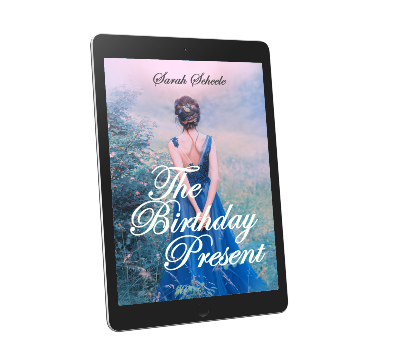 My book The Birthday Present is about a tough world (think post-apocalyptic) with a lot of income disparity. But that doesn’t mean all hope is lost—especially when people you didn’t expect to be the good guys turn out to surprise you. 😊
My book The Birthday Present is about a tough world (think post-apocalyptic) with a lot of income disparity. But that doesn’t mean all hope is lost—especially when people you didn’t expect to be the good guys turn out to surprise you. 😊
Life after the apocalypse is supposed to be simple.
World collapse is absolutely bad news. A disaster of the worst order. And when it was generated by the rising of engineered mutants who created an autocracy whose sole purpose seems to be to trample on humans, it's inevitable that the world is filled with so many injustices you lose track of counting them on your fingers. Humans are also said to be extinct. And mutants are supposedly oppressors, never victims. Oh, and mutants are never out to get each other, only humans. In short, there can be a lot of assumptions about the distant future.
The one thing that is certain, though, is that some people in this bleak world have a lot more money than others. In this pair of novelettes, two girls (Lucy a human and Alyce a mutant) find themselves tangled up with the rich and famous of the millennium following ours. Lucy is a bubbly and reckless girl who befriends every boy she meets and Alyce is patient and tolerant to an extreme. But Lucy has a little nefarious scheme under her sleeve and Alyce, it seems, does have a limit to her patience after someone tries to kill her simply for being related to someone else.
I mean, who wouldn't get annoyed by that, right?
And there will be more updates.
Every little kid is told you have to be good at least once or you won’t get ANY gifts. (This is one of the reasons peace and friendliness become so common this time of year, as many people clock in their last-minute acts of kindness. 😊) And the holidays are one of the few times of year when people lay off some of their disdain for talking about money. After all, we all know someone less fortunate than we are and this is a time of year when we reflect on it. Even in our own families, some people are able to afford more or nicer or newer gifts to give, while others simply give what they can. And I know in my own family there is never any jealousy, backstabbing, or pride about that. It doesn’t matter WHAT you get. It’s that someone cared enough to give you a sign of affection and love.
That’s what Christmas is all about—doing what you can, not competing with others, is what matters. Christ, whose birth is celebrated during this holiday, once praised a woman who was very poor. But she still gave the tiny amount that she was able—a mite, in fact—to the temple. He approved of her more than many who gave bigger gifts that meant little to them. Because for her, that tiny donation was a true sacrifice and a sign of her love for God.
During this season, churches offer chances to donate gifts to charities around town. Our church has a display for several charities with a Christmas tree for each one and every year we buy a little gift to give to a stranger—someone unknown. They need basic pajamas and personal care items, T-shirts and sports clothes for youth events, gift cards for supplies and food, winter clothes—and God. When people are cold and selfish to others, their chance to reflect God’s nature is lost. Instead, the less fortunate see a world that doesn’t care about them and a God who is far away. Deep inside, many of us feel we’re the “less fortunate” at times. Almost everyone, like I said, knows someone they think is doing better. It’s hard to admit someone might see US as fortunate and it takes humility to accept that and give what we can even if we feel we are not doing as well as we’d like.
After all, this is a bad world. Nobody is doing as well as they should. Nobody is perfect. And nobody has an excuse not to care about the person next to them.
 My book The Birthday Present is about a tough world (think post-apocalyptic) with a lot of income disparity. But that doesn’t mean all hope is lost—especially when people you didn’t expect to be the good guys turn out to surprise you. 😊
My book The Birthday Present is about a tough world (think post-apocalyptic) with a lot of income disparity. But that doesn’t mean all hope is lost—especially when people you didn’t expect to be the good guys turn out to surprise you. 😊 Life after the apocalypse is supposed to be simple.
World collapse is absolutely bad news. A disaster of the worst order. And when it was generated by the rising of engineered mutants who created an autocracy whose sole purpose seems to be to trample on humans, it's inevitable that the world is filled with so many injustices you lose track of counting them on your fingers. Humans are also said to be extinct. And mutants are supposedly oppressors, never victims. Oh, and mutants are never out to get each other, only humans. In short, there can be a lot of assumptions about the distant future.
The one thing that is certain, though, is that some people in this bleak world have a lot more money than others. In this pair of novelettes, two girls (Lucy a human and Alyce a mutant) find themselves tangled up with the rich and famous of the millennium following ours. Lucy is a bubbly and reckless girl who befriends every boy she meets and Alyce is patient and tolerant to an extreme. But Lucy has a little nefarious scheme under her sleeve and Alyce, it seems, does have a limit to her patience after someone tries to kill her simply for being related to someone else.
I mean, who wouldn't get annoyed by that, right?
And there will be more updates.
Published on December 23, 2021 08:30
December 9, 2021
What Do You Believe?
It’s a pretty good bet a lot of you are getting ready for the holidays, right? 😊
Of course, for many Christians like myself (as well as a hefty chunk of Americans who aren’t Christians but celebrate our biggest and most popular holiday anyway) it’s about Christmas. The year-end festival devoted to commemorating Christ’s birth. But by holidays this year I really do mean what I say, because the last 3 weeks have been Thanksgiving, Christmas, and birthday all rolled into one!
Thanksgiving we visited my sister in Oklahoma, as I mentioned last newsletter, and while there we went to see a Christmas lights show and did some ice skating. There was a small rink with very rough ice on the outskirts of the light displays, so the four of us sisters had a lot of fun there. For two of us, including me, it was a first to ever try to put on skates and hobble around the rink as true beginners, gripping the sides for support. I fell on my right side when I got going a little faster and developed a big bruise over the next few days. Lol My married sister said she’s still pretty bad at skating but it appears her husband is a natural—although he didn’t join us to skate that evening, so I didn’t get to see for myself.
Next day they gave me an early birthday gift (full set of all 5 Ice Age DVDs, eek) while attempting to visit a park with a waterfall—Turner Falls. Unfortunately, it was closed. Only 2 days in the year it’s closed and that day was one of them. But I got some really nice pics of the scenery from a distance, climbing around some rocks, and spent some quality time with family as we posed for group pictures. We used to do this years ago, but have not got together to do it for a long time.
Then this Wednesday was my birthday. Yes, I was born the day after Pearl Harbor Day and it seems, from anecdotes, that the doctors who delivered me discussed Pearl Harbor while I was being born. Go figure. 😊 Monday was very close to the day and there was a lovely concert of religious music held at Baylor University by a small student choir. They perform this every year in the Armstrong Browning Library, a simply gorgeous little building dedicated entirely to the poets Robert and Elizabeth Browning. I snapped a few pics of the room and the singers (who are DIMLY VISIBLE in the extreme front of one shot) although the pics just really don’t do it justice. It was a beautiful place and a perfect evening.
Here's a link to a video I took while riding in a horse-drawn carriage. It really captures the sights and sounds of the Christmas lights show.
And here are a few pics from various places I went.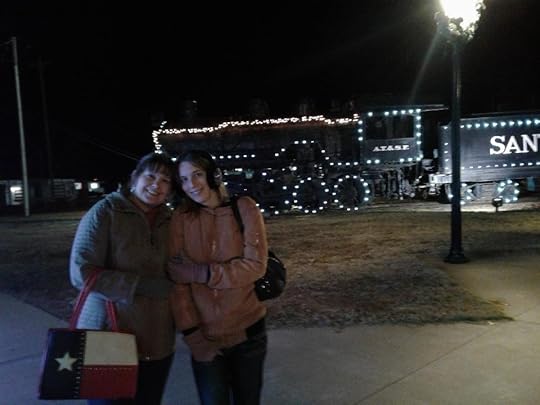
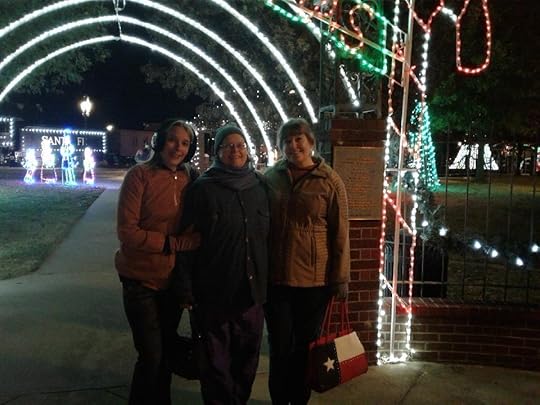











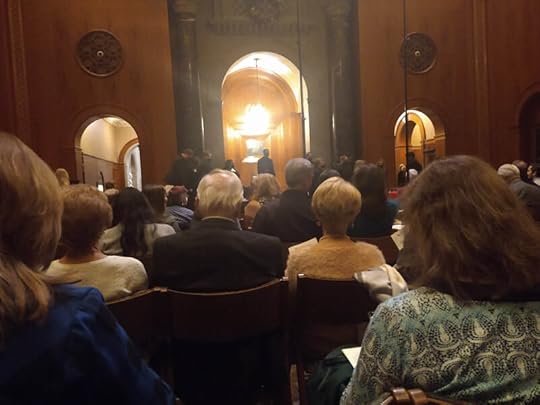
 Which brings me to the point—during this holiday season, which is centered around an event meaningful to a particular religion, the thought at hand for everyone is “what do you believe?” Because everyone has a philosophy or religion of some sort. I won’t be presenting any review copies this week since I doubt anyone has time to review for the next couple weeks. But I’ve done a nice, snappy little overhaul of my book’s interior formatting and the descriptions for all except the Palladia Trilogy. I want to add a little teaser scene about the next installment in the back of each book, so that will take a little longer. And I’ll leave you with thoughts about Facets of Fantasy, a book that is all about what the characters believe morally and philosophically. 😊
Which brings me to the point—during this holiday season, which is centered around an event meaningful to a particular religion, the thought at hand for everyone is “what do you believe?” Because everyone has a philosophy or religion of some sort. I won’t be presenting any review copies this week since I doubt anyone has time to review for the next couple weeks. But I’ve done a nice, snappy little overhaul of my book’s interior formatting and the descriptions for all except the Palladia Trilogy. I want to add a little teaser scene about the next installment in the back of each book, so that will take a little longer. And I’ll leave you with thoughts about Facets of Fantasy, a book that is all about what the characters believe morally and philosophically. 😊 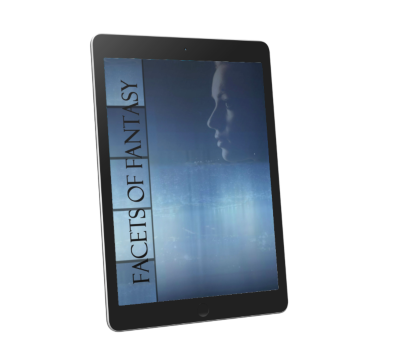 What do you believe? When it comes to Karl, Don, & Juranai, that's never been in any doubt. Until they run into situations that challenge their beliefs to the core.
What do you believe? When it comes to Karl, Don, & Juranai, that's never been in any doubt. Until they run into situations that challenge their beliefs to the core.
For Karl Kallai, like all Medosans, following a path of destructive glory seems inevitable. He's going to chase down the ancient Golden Belt of the Kings no matter what. Visiting the enemy city of Niferna on a diplomatic tour isn't nearly as interesting as searching for magical artifacts. Until the darkness within the things he seeks is challenged by the last person he expected.
Don Tachimant, born in the intergalactic world of the far future, is a skeptic. He believes only in family and government—and as a lawbreaker and a runaway from home, increasingly doesn't believe in those either. When he's dragged back to his family's military school on a secret mission, he finds that great spiritual power is flourishing right under his nose.
Juranai, a grandson of the Wolf-King Thazan, is able to change his form from human to wolf. For enchanted beings like himself, it's natural to believe in the mythical kingdom of Tsayan. But all that is very much in the shadows for Violet Vail, a human from modern Renari. These legends are about as improbable as King Arthur's sword—until a run-in with Juranai leads her straight into the past.
And there will be more updates.
Of course, for many Christians like myself (as well as a hefty chunk of Americans who aren’t Christians but celebrate our biggest and most popular holiday anyway) it’s about Christmas. The year-end festival devoted to commemorating Christ’s birth. But by holidays this year I really do mean what I say, because the last 3 weeks have been Thanksgiving, Christmas, and birthday all rolled into one!
Thanksgiving we visited my sister in Oklahoma, as I mentioned last newsletter, and while there we went to see a Christmas lights show and did some ice skating. There was a small rink with very rough ice on the outskirts of the light displays, so the four of us sisters had a lot of fun there. For two of us, including me, it was a first to ever try to put on skates and hobble around the rink as true beginners, gripping the sides for support. I fell on my right side when I got going a little faster and developed a big bruise over the next few days. Lol My married sister said she’s still pretty bad at skating but it appears her husband is a natural—although he didn’t join us to skate that evening, so I didn’t get to see for myself.
Next day they gave me an early birthday gift (full set of all 5 Ice Age DVDs, eek) while attempting to visit a park with a waterfall—Turner Falls. Unfortunately, it was closed. Only 2 days in the year it’s closed and that day was one of them. But I got some really nice pics of the scenery from a distance, climbing around some rocks, and spent some quality time with family as we posed for group pictures. We used to do this years ago, but have not got together to do it for a long time.
Then this Wednesday was my birthday. Yes, I was born the day after Pearl Harbor Day and it seems, from anecdotes, that the doctors who delivered me discussed Pearl Harbor while I was being born. Go figure. 😊 Monday was very close to the day and there was a lovely concert of religious music held at Baylor University by a small student choir. They perform this every year in the Armstrong Browning Library, a simply gorgeous little building dedicated entirely to the poets Robert and Elizabeth Browning. I snapped a few pics of the room and the singers (who are DIMLY VISIBLE in the extreme front of one shot) although the pics just really don’t do it justice. It was a beautiful place and a perfect evening.
Here's a link to a video I took while riding in a horse-drawn carriage. It really captures the sights and sounds of the Christmas lights show.
And here are a few pics from various places I went.














 Which brings me to the point—during this holiday season, which is centered around an event meaningful to a particular religion, the thought at hand for everyone is “what do you believe?” Because everyone has a philosophy or religion of some sort. I won’t be presenting any review copies this week since I doubt anyone has time to review for the next couple weeks. But I’ve done a nice, snappy little overhaul of my book’s interior formatting and the descriptions for all except the Palladia Trilogy. I want to add a little teaser scene about the next installment in the back of each book, so that will take a little longer. And I’ll leave you with thoughts about Facets of Fantasy, a book that is all about what the characters believe morally and philosophically. 😊
Which brings me to the point—during this holiday season, which is centered around an event meaningful to a particular religion, the thought at hand for everyone is “what do you believe?” Because everyone has a philosophy or religion of some sort. I won’t be presenting any review copies this week since I doubt anyone has time to review for the next couple weeks. But I’ve done a nice, snappy little overhaul of my book’s interior formatting and the descriptions for all except the Palladia Trilogy. I want to add a little teaser scene about the next installment in the back of each book, so that will take a little longer. And I’ll leave you with thoughts about Facets of Fantasy, a book that is all about what the characters believe morally and philosophically. 😊  What do you believe? When it comes to Karl, Don, & Juranai, that's never been in any doubt. Until they run into situations that challenge their beliefs to the core.
What do you believe? When it comes to Karl, Don, & Juranai, that's never been in any doubt. Until they run into situations that challenge their beliefs to the core.For Karl Kallai, like all Medosans, following a path of destructive glory seems inevitable. He's going to chase down the ancient Golden Belt of the Kings no matter what. Visiting the enemy city of Niferna on a diplomatic tour isn't nearly as interesting as searching for magical artifacts. Until the darkness within the things he seeks is challenged by the last person he expected.
Don Tachimant, born in the intergalactic world of the far future, is a skeptic. He believes only in family and government—and as a lawbreaker and a runaway from home, increasingly doesn't believe in those either. When he's dragged back to his family's military school on a secret mission, he finds that great spiritual power is flourishing right under his nose.
Juranai, a grandson of the Wolf-King Thazan, is able to change his form from human to wolf. For enchanted beings like himself, it's natural to believe in the mythical kingdom of Tsayan. But all that is very much in the shadows for Violet Vail, a human from modern Renari. These legends are about as improbable as King Arthur's sword—until a run-in with Juranai leads her straight into the past.
And there will be more updates.
Published on December 09, 2021 08:30
November 25, 2021
A Journey Into Readership
I spent about three days this week traveling to and from Oklahoma to visit my sister and her husband for Thanksgiving. Everyone in our family went and it was my first time to go up there to see her. I went by car on the way there and by train on the way back and did a lot of eating and family time together in between. I had never been out of my state before. I have traveled to foreign countries, but not other states in the US, since Texas is so big that it takes a while just to get across it. 😊 Besides, I’ve never been a big traveler—I would definitely call myself a homebody. So getting to see the beautiful state of Oklahoma was a first for me and I am really glad I went. Soon after crossing the Red River I snapped this awesome moment of a row of wind turbines silhouetted against a low afternoon sun. Fantastic. Next week I'll post some pics of a splendid Christmas lights show we visited, which featured horse-drawn carriages, a Ferris wheel, ice skating, and all kinds of light displays sponsored by local businesses. But I didn't have time to go through the photos before sending off this newsletter.
Getting out of the house made me reflective about my writing. Sometimes I spend so much time locked on the computer screen worrying if I am expressing myself clearly and communicating my message that I don’t think about people outside the writing bubble. Seeing all the people on the train and in the places we visited in Oklahoma made me wonder if they would be interested in my books. I imagined describing books to them and making a sales pitch—although I didn’t actually do this as I didn’t want to distract from the holiday time with my family. Many writing coaches recommend getting a really targeted visual image of your reader in your mind, almost as detailed as a specific person. While that focus hasn’t been 100% absent from the last few years, it hasn’t been at the forefront as I was more zoned into the actual mechanics of putting the books at a good level of writing. Journeying to a new place always creates a new story for me—and it also inspires me to get my books out there even more for people to read. Review copies for the next 2 weeks are Victoria: A Tale of Spain and A Year with the Harrisons. If you complete a 5-star review and put it on 3 or more retailers, you can email me with your mailing address and links to the reviews and I will mail you a complimentary signed paperback copy of the book you reviewed. This isn’t an “incentive” just a thank you, and should not encourage you to put up a favorable review unless it is your real opinion.
Review copies for the next 2 weeks are Victoria: A Tale of Spain and A Year with the Harrisons. If you complete a 5-star review and put it on 3 or more retailers, you can email me with your mailing address and links to the reviews and I will mail you a complimentary signed paperback copy of the book you reviewed. This isn’t an “incentive” just a thank you, and should not encourage you to put up a favorable review unless it is your real opinion.
Victoria: A Tale of Spain Review Copy
A Year with the Harrisons Review Copy
And there will be more updates.
Getting out of the house made me reflective about my writing. Sometimes I spend so much time locked on the computer screen worrying if I am expressing myself clearly and communicating my message that I don’t think about people outside the writing bubble. Seeing all the people on the train and in the places we visited in Oklahoma made me wonder if they would be interested in my books. I imagined describing books to them and making a sales pitch—although I didn’t actually do this as I didn’t want to distract from the holiday time with my family. Many writing coaches recommend getting a really targeted visual image of your reader in your mind, almost as detailed as a specific person. While that focus hasn’t been 100% absent from the last few years, it hasn’t been at the forefront as I was more zoned into the actual mechanics of putting the books at a good level of writing. Journeying to a new place always creates a new story for me—and it also inspires me to get my books out there even more for people to read.
 Review copies for the next 2 weeks are Victoria: A Tale of Spain and A Year with the Harrisons. If you complete a 5-star review and put it on 3 or more retailers, you can email me with your mailing address and links to the reviews and I will mail you a complimentary signed paperback copy of the book you reviewed. This isn’t an “incentive” just a thank you, and should not encourage you to put up a favorable review unless it is your real opinion.
Review copies for the next 2 weeks are Victoria: A Tale of Spain and A Year with the Harrisons. If you complete a 5-star review and put it on 3 or more retailers, you can email me with your mailing address and links to the reviews and I will mail you a complimentary signed paperback copy of the book you reviewed. This isn’t an “incentive” just a thank you, and should not encourage you to put up a favorable review unless it is your real opinion.Victoria: A Tale of Spain Review Copy
A Year with the Harrisons Review Copy
And there will be more updates.
Published on November 25, 2021 10:30



